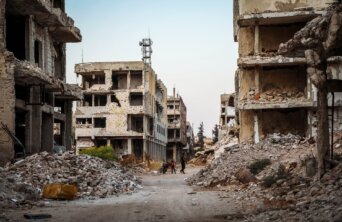- About
- Topics
- Picks
- Audio
- Story
- In-Depth
- Opinion
- News
- Donate
- Signup for our newsletterOur Editors' Best Picks.Send
Read, Debate: Engage.
| topic: | Political violence |
|---|---|
| located: | Syria |
| editor: | Shadi Khan Saif |
The Arab League’s warm embrace of Syria’s Bashar al-Assad this month following a decade-long bloody civil war is an entirely unexpected diplomatic decision that was born out of strategic necessities and disregards the rights and liberties of the Syrian people.
Arab League leaders welcomed Assad to a meeting in Jeddah, Saudi Arabia without stipulating any preconditions or other diplomatic strings regarding the future of millions of Syrians inside the war-ravaged country and those displaced by the conflict. In his remarks, Assad stated, “I hope that it marks the beginning of a new phase of Arab action for solidarity among us, for peace in our region, development and prosperity instead of war and destruction.”
Let us do a quick recap of the events that led to the eruption of Syria’s civil war and subsequent humanitarian crisis.
With the advent of social media around 2010, a revolutionary wave of awakening dubbed the “Arab Spring” had swept across the Arab world and saw youngsters mobilising online and taking to the streets to demand rights and liberties. Several countries such as Tunisia, saw a collapse of decades-long authoritarian regimes, while others, such as Syria, underwent an ongoing brutal crackdown on dissidents by the state.
In the subsequent years, major powers, such as the US, Russia, Turkey, Iran and Saudi Arabia, began to settle scores against each other by arming different parties to the Syrian conflict, which ended up reducing many parts of this historic country to rubble, costing the lives of nearly half a million people and forcing millions to flee.
Undoubtedly, a diplomatic and peaceful resolution to the conflict is preferred to the vicious cycle of violence fuelled by domestic and international actors motivated by strategic interest. But what about the countless lives lost during this war? Who will be held accountable and work to guarantee the Syrian people’s right to a dignified and safe life.
This pattern of global powers hijacking a public uprising in authoritarian countries to settle international scores has devastated nations from Afghanistan and Iraq to Sudan, Syria and wrought havoc on their citizens. It is only through unwavering support, education and awareness-building dialogue that democratic principles can take roots.
Assad has no legitimacy left to represent Syria after his brutal use of force to crush the popular uprising demanding liberties. Arab youth need to be asking their leaders why they now ignore these atrocities. The top counties in the Arab League are least expected to play that role in Syria, but internationally they can be pushed and held accountable for not posing a clear ultimatum to Assad.
Image by Mahmoud Sulaiman.
